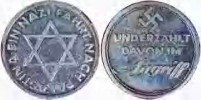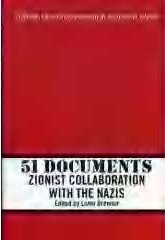of the long-nosed Negro type, with wooly deep-black hair ... He maintains, however, the racial point of view – something I can’t accept, for I have merely to look at him and at myself. All I say is: we are an historical unit, one nation with anthropological diversities. [i]
Unconcerned with religion, he even proposed that an atheist, the then world-famous author, Max Nordau, should succeed him as the WZO’s President. Again, the disciple was less liberal than the master. Nordau was married to a Christian, and was afraid that his wife would be resented by the Orthodox among the ranks. [ii] He was already married when he converted to Zionism and, despite his own Gentile wife, he soon became a confirmed Jewish racist. On 21 December 1903 he gave an interview to Eduard Drumont’s rabid anti-Semitic newspaper, La Libre Parole, in which he said that Zionism wasn’t a question of religion, but exclusively of race, and “there is no one with whom I am in greater agreement on this point than M. Drumont”. [iii]
Although only one national branch of the WZO (the Dutch Federation in 1913) ever went to the trouble of trying formally to exclude Jews living in mixed marriages, cosmopolitan Zionism died an early death with Herzl in 1904. [iv] The WZO as such never had to take a position against mixed marriage; those who believed in it rarely thought to join the obviously unsympathetic Zionists. The movement in Eastern Europe, its mass base, shared the spontaneous folk-religious prejudices of the Orthodox communities around them. Although the ancient Jews had seen proselytising and marriages to Gentiles as adding to their strength, latter pressure from the Catholic Church caused the rabbis to begin to see converts as a “troublesome itch” and they abandoned proselytising. With the centuries, self-segregation became the hallmark of the Jews. In time the masses came to see mixed marriage as treason to Orthodoxy. Although in the West some Jews modified the religion and formed “Reform” sects and others abandoned the God of their forefathers, the traffic was essentially away from Judaism. Few joined the Jewish world either by conversion or marriage. If Western Zionism developed in a more secular atmosphere than that of Eastern Europe, the bulk of its members still saw mixed marriage as leading Jews away from the community rather than bringing new additions to it.
The German university graduates, who took over the Zionist movement after Herzl’s death, developed the modernist-racist ideology of Jewish separatism. They had been powerfully influenced by their pan-Germanic fellow students of the Wandervögel (wandering birds or free spirits) who dominated the German campuses before 1914. These chauvinists rejected the Jews as not being of Germanic Blut; therefore they could never be part of the German Volk and were thoroughly alien to the Teutonic Boden or soil. All Jewish students were compelled to grapple with these concepts which surrounded them. A few moved left and joined the Social Democrats. To them this was just more bourgeois nationalism and was to be fought as such. Most remained conventionally Kaiser-treu, stout nationalists who insisted that a thousand years on the German Boden had made them into “Germans of the Mosaic persuasion”. But a portion of the Jewish students adopted the wandervogel ideology whole and simply translated it into Zionist terminology. They agreed with the anti-Semites on several key points: the Jews were not part of the German Volk and, of course, Jews and Germans should not mix sexually, not for the traditional religious reasons, but for the sake of their own unique Blut. Not being of Teutonic Blut, they perforce had to have their own Boden: Palestine.
At first glance it would appear strange that middle-class Jewish students should be so influenced by anti-Semitic thought, especially as at the same time, socialism, with its assimilationist attitudes towards the Jews, was gaining considerable support in the society around them. However, socialism appealed primarily to the workers, not to the middle class. In their environment chauvinism predominated; although intellectually they repudiated their connection with the German people, in fact they never emancipated themselves from the German capitalist class, and throughout the First World War the German Zionists passionately supported their own government. For all their grandiose intellectual pretensions, their völkisch Zionism was simply an imitation of German nationalist ideology. Thus the young philosopher Martin Buber was able to combine Zionism with ardent German patriotism during the First World War. In his book Drei Reden ueber das Judentum, published in 1911, Buber spoke of a youth who:
senses in this immortality of the generations a community of blood, which he feels to be the antecedents of his I, its perseverance in the infinite past. To that is added the discovery, promoted by this awareness, that blood is a deep rooted nurturing force within individual man; that the deepest layers of our being are determined by blood; that our innermost thinking and our will are colored by it. Now he finds that the world around him is the world of imprints and influences, whereas blood is the realm of a substance capable of being imprinted and influenced, a substance absorbing and assimilating all into its own form Whoever, faced with the choice between environment and substance, decides for substance will henceforth have to be a Jew truly from within, to live as a Jew with all the contradiction, all the tragedy, and all the future promise of his blood. [v]
The Jews had been in Europe for millenniums, far longer than, say, the Magyars. No one would dream of referring to the Hungarians as Asiatics, yet, to Buber, the Jews of Europe were still Asians and presumably always would be. You could get the Jew out of Palestine, but you could never get Palestine out of the Jew. In 1916 he wrote that the Jew:
was driven out of his land and dispersed throughout the lands of the Occident yet, despite all this, he has remained an Oriental One can detect all this in the most assimilated Jew, if one knows how to gain access to his soul ... the immortal Jewish unitary drive – this will come into being only after the continuity of life in Palestine ... Once it comes into contact with its maternal soil, it will once more become creative. [vi]
However, Buber’s völkisch Zionism, with its assorted strands of mystical enthusiasm, was too spiritual to appeal to a wide following. What was needed was a popular Zionist version of the social-Darwinism which had swept the bourgeois intellectual world in the wake of Europe’s imperial conquests in Africa and the East. The Zionist version of this notion was developed by the Austrian anthropologist Ignatz Zollschan. To him the secret value of Judaism was that it had, albeit inadvertently, worked to produce a wonder of wonders:
a nation of pure blood, not tainted by diseases of excess or immorality, of a highly developed sense of family purity, and of deeply rooted virtuous habits would develop an exceptional intellectual activity. Furthermore, the prohibition against mixed marriage provided that these highest ethnical treasures should not be lost, through the admixture of less carefully bred races ... there resulted that natural selection which has no parallel in the history of the human race ... If a race that is so highly gifted were to have the opportunity of again developing its original power, nothing could equal it as far as cultural value is concerned. [vii]
Even Albert Einstein subscribed to the Zionist race conceptions and in so doing he reinforced racism, lending it the prestige of his reputation. His own contributions to the discussion sound suitably profound, but they are based on the same nonsense.
Nations with a racial difference appear to have instincts which work against their fusion. The assimilation of the Jews to the European nations ... could not eradicate the feeling of lack of kinship between them and those among whom they lived. In the last resort, the instinctive feeling of lack of kinship is referable to the law of the conservation of energy. For this reason it cannot be eradicated by any amount of well meant pressure. [viii]
Buber, Zollschan and Einstein were but three among the classic Zionists who pontificated learnedly on race purity. But for sheer fanaticism few could match the American Maurice Samuel. A well-known writer in his day – later, in the 1940s, he was to work with Weizmann on the latter’s autobiography – Samuel addressed the American public in 1927 in his I, the Jew. He denounced with horror a town which he readily conceded that he only knew by repute – and that the evidence would make us think was the free-living artists’ colony at Taos, New Mexico:
there came together into this small place, representatives of the African Negro, the American and Chinese Mongol, the Semite and the Aryan ... free intermarriage had set in ... Why does this picture, part actual, part fanciful, fill me with a strange loathing, suggest the obscene, the obscurely beastly? ... Why then does that village which my fancy conjures up call to mind a heap of reptiles breeding uglily in a bucket? [ix]
----------
i. Marvin Lowenthal (ed.), The Diaries of Theodor Herzl, p.78.
ii. Amos Elon, Herzl, p.255.
iii. Desmond Stewart, Theodor Herzl, p.322.
iv. The WZO is structured by national states, and elections are held on a national basis for the World Zionist Congress; the various ideological tendencies which are world-wide in their structure, run in the various national elections for delegates.
v. Martin Buber, On Judaism, pp.15-19.
vi. Ibid., pp.75-7.
vii. Ignatz Zollschan, Jewish Questions (1914) pp.17-18.
viii. Solomon Goldman, Crisis and Decision (1938), p.116.
ix. Maurice Samuel, I, the Jew, pp.244-6.


